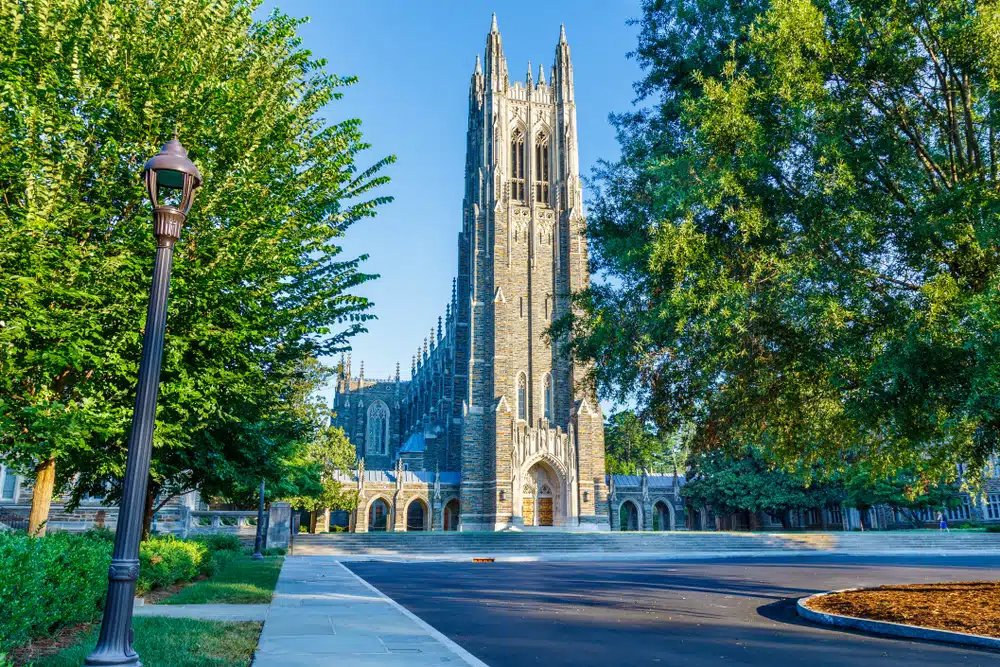Duke University offers many extracurricular activities that allow students to go beyond the classroom and explore their passions and interests. Engaging in these activities provides numerous personal and professional benefits for students. This article will delve into the importance of extracurricular activities, give an overview of the options available at Duke, and discuss how involvement can positively impact student life. Furthermore, we will explore the future prospects and opportunities awaiting students actively participating in extracurricular activities.
Understanding the Importance of Extracurricular Activities
Extracurricular activities play a crucial role in a student’s holistic development. They provide opportunities for students to pursue their interests outside their academic studies, fostering personal growth and enhancing societal skills. For instance, participation in extracurricular activities allows students to refine their time management, leadership, and teamwork abilities.
Extracurricular activities are not just a way to fill up free time; they offer many benefits beyond the classroom. These activities allow students to explore new interests and develop a well-rounded skill set. Whether joining a sports club or immersing in an art and culture group, each activity brings unique experiences and challenges that contribute to personal development.
Moreover, engaging in extracurricular activities provides an avenue to connect with like-minded peers and build lasting friendships. These activities create a sense of community and belonging, allowing students to form bonds with others who share their passions and interests. The companies formed through extracurriculars often extend beyond the activity, creating a support system that can enhance a student’s overall well-being.
Benefits of Participating in Extracurricular Activities
Furthermore, participating in extracurricular activities has been linked to improved academic performance. Contrary to popular belief, dedicating time to these activities often results in better time management skills, leading to greater focus and educational productivity. When students are involved in extracurriculars, they learn how to prioritize their responsibilities and manage their time effectively, which can translate into better study habits and improved grades.
In addition to time management skills, extracurricular involvement enhances critical thinking, problem-solving, and communication abilities that are transferrable to the classroom. For example, participating in a debate club can sharpen students’ ability to think critically and articulate their thoughts effectively. These skills can then be applied to academic tasks such as analyzing literature or presenting research findings.
Moreover, extracurricular activities provide real-world experiences that cannot be replicated in a classroom setting. Students learn to work collaboratively in teams, negotiate conflicts, and take on leadership roles. These experiences build character and prepare students for future professional endeavors, where teamwork and leadership skills are highly valued.
Balancing Academics and Extracurricular Activities
While extracurricular activities are undoubtedly beneficial, balancing academics and extracurricular commitments is essential. Duke University recognizes the importance of academic excellence and encourages students to prioritize their studies. Developing effective time management strategies is crucial to ensure that both aspects of student life receive sufficient attention.
One effective strategy for balancing academics and extracurricular activities is to create a schedule that allocates specific time slots for studying and participating in extracurriculars. This way, students can dedicate focused time to their academic responsibilities while still having ample time to engage in their chosen activities.
Additionally, it is essential for students to communicate with their teachers and extracurricular advisors to ensure that they are aware of any conflicting commitments. By being proactive and open about their schedules, students can seek support and make necessary adjustments to maintain a healthy balance between their academic and extracurricular pursuits.
In conclusion, extracurricular activities are integral to a student’s educational journey. They provide opportunities for personal growth, skill development, and social connections. Students can enhance their academic performance, develop essential life skills, and create lasting memories by participating in extracurriculars. It is crucial for students to find a balance between academics and extracurricular commitments to ensure a well-rounded and fulfilling educational experience.
Overview of Extracurricular Activities at Duke University
Duke University offers a diverse range of extracurricular activities to cater to the varied interests of its students. These activities can be broadly classified into sports and fitness clubs, arts and culture groups, and academic and professional organizations.
Sports and Fitness Clubs
For those passionate about sports and physical fitness, Duke University provides numerous opportunities to get involved. The university has various varsity and club-level sports teams, catering to competitive athletes and recreational enthusiasts. From basketball and soccer to swimming and golf, students can find options that suit their interests and skill levels.
Students who are interested in team sports can join one of Duke’s many varsity teams. These teams compete at the highest level and offer students the chance to represent the university in intercollegiate competitions. The varsity teams also provide access to top-notch coaching and training facilities, ensuring athletes have the support they need to excel.
For those who prefer a more casual approach to sports and fitness, Duke offers a variety of club-level teams. These teams are open to all students and provide a fun and inclusive environment for individuals to participate in their favorite sports. Whether it’s ultimate frisbee, rock climbing, or even quidditch, there’s a club for everyone at Duke.
Arts and Culture Groups
Art and culture enthusiasts can immerse themselves in the rich artistic landscape offered by Duke University. The university hosts various music ensembles, dance groups, theater productions, and visual arts clubs. Whether students are interested in singing, dancing, acting, or painting, they can find a vibrant community that shares their passion.
Duke’s music ensembles allow students to showcase their musical talents and perform in front of live audiences. From orchestras and choirs to jazz bands and cappella groups, there are plenty of options for students to explore their musical interests. The university also hosts regular concerts and recitals, providing a platform for students to showcase their skills.
For those passionate about the performing arts, Duke’s theater productions offer a chance to get involved in all aspects of theater, from acting and directing to set design and costume creation. The university’s theater groups put on various productions throughout the year, ranging from classic plays to contemporary works, allowing students to hone their skills and express their creativity.
Academic and Professional Organizations
Duke University recognizes the importance of fostering intellectual curiosity and professional development. Numerous academic and professional organizations cater to specific fields of study, such as engineering, business, journalism, and more. These organizations offer seminars, workshops, and networking opportunities to help students build valuable skills and connections in their chosen fields.
Students interested in engineering can join organizations focusing on robotics, sustainable energy, or aerospace engineering. These organizations often collaborate with industry professionals and provide hands-on experiences, allowing students to apply their classroom knowledge to real-world projects.
For aspiring entrepreneurs, Duke offers a range of business and entrepreneurship clubs. These organizations provide resources and support for students looking to start their ventures, including mentorship programs, pitch competitions, and networking events. Students can learn from successful entrepreneurs and gain practical skills to benefit their careers.
Journalism enthusiasts can join student-run publications and media organizations to gain experience in writing, reporting, and multimedia production. These organizations often cover campus news and events, allowing students to develop their journalistic skills and contribute to the university community.
Getting Involved in Duke University’s Extracurricular Activities
Joining a club or organization at Duke University is a straightforward process. There are typically club fairs at the beginning of each semester, where students can learn about various extracurricular options and sign up for those that interest them. Additionally, each club usually has an information session to provide more details and answer any questions. Duke also provides an online platform where students can explore and join clubs throughout the year.
Duke University’s extracurricular scene is vibrant and diverse, offering a wide range of clubs and organizations to cater to every interest and passion. There’s something for everyone, whether you’re into sports, arts, community service, or academic pursuits.
When joining a club or organization, it’s essential to research and understand its purpose and activities. This ensures that your interests align with the club’s goals and objectives, making your experience more fulfilling. Attending introductory meetings and contacting current members can provide valuable insights into the club’s culture and expectations, helping you make an informed decision.
Once you’ve found the perfect club or organization, signing up is as simple as providing the necessary information and paying any dues if required. The process is designed to be user-friendly and accessible for all students, ensuring everyone can get involved.
How to Join a Club or Organization
When considering joining a club or organization, it is essential to research and understand its purpose and activities. This ensures the individual’s interests align with the club’s goals and objectives. Attending introductory meetings and contacting current members can provide valuable insights into the club’s culture and expectations. Once a decision is made, signing up is as simple as providing the necessary information and paying any dues if required.
Moreover, Duke University encourages students to explore multiple clubs and organizations to broaden their horizons and discover new interests. This allows students to engage in diverse activities and connect with individuals from different backgrounds, fostering a sense of community and personal growth.
Starting Your Own Club or Organization
If a student has a specific interest or passion not represented by existing clubs, Duke University allows students to start their own clubs or organizations. This provides an excellent opportunity to create a community around shared interests and positively impact campus life.
Starting a club or organization involves gathering a group of like-minded individuals who share the same passion. Together, you can develop a mission statement that encapsulates the purpose and objectives of the club. Once you have a clear vision, you must obtain the necessary approvals from the university to ensure that your club adheres to the institution’s guidelines and regulations.
Planning activities that align with the club’s purpose is crucial for its success. This can include organizing workshops, hosting guest speakers, participating in competitions, or engaging in community service. By creating a dynamic and engaging environment, your club can attract like-minded individuals who share your passion and contribute to the overall campus experience.
Starting your own club or organization allows you to pursue your interests and provides valuable leadership and organizational skills. It’s a chance to impact the Duke University community and leave a legacy for future generations of students.
The Impact of Extracurricular Activities on Student Life
Engaging in extracurricular activities offers more than just personal development; it significantly enhances the overall student experience at Duke University.
Building a Sense of Community
Extracurricular activities bring students together, fostering a sense of belonging and community. The bonds formed through shared experiences and common interests can last a lifetime. Whether working on a group project, participating in a team sport, or performing in a music ensemble, these interactions help create a supportive and inclusive environment.
Developing Leadership and Other Skills
Extracurricular activities provide ample opportunities for students to develop leadership skills. By taking on roles such as club presidents, team captains, or event coordinators, students learn to effectively manage and motivate a team. The decision-making and problem-solving abilities gained from these experiences are invaluable and transferable to future professional endeavors.
Future Prospects and Opportunities through Extracurricular Activities
Active extracurricular activities can open doors to various opportunities beyond the university years.
Networking and Career Opportunities
Networking is a critical aspect of career development, and extracurricular activities offer a platform to connect with professionals in different fields. Events, guest speakers, and alumni interactions organized by clubs and organizations can provide valuable insights into various industries. Additionally, being actively involved in extracurriculars demonstrates initiative and a well-rounded skill set, making students more competitive in the job market.
Personal Growth and Development Opportunities
Participating in extracurricular activities allows students to explore their interests and passions, leading to personal growth and self-discovery. Engaging in activities outside their academic studies helps students broaden their perspectives, build resilience, and challenge themselves. These experiences contribute to their overall development and prepare them for future success.
Extracurricular activities offer Duke University students an enriching and well-rounded university experience. By exploring and engaging in these activities, students enhance their personal growth, create connections, develop essential skills, and unlock future opportunities. Duke University’s commitment to a dynamic extracurricular environment amplifies the academic journey and prepares students for a successful future beyond graduation.
If you want to discuss the matter to a greater extent or inquire about college admissions, look no further! Our experts here at AdmissionSight can help you! Here at AdmissionSight, we have over a decade’s worth of experience guiding students through the competitive admissions process to get accepted to the top universities in the world. Feel free to set up an appointment today to book your initial consultation.









































